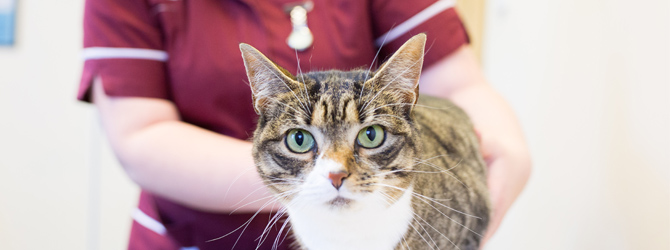Cancer in cats: feline cancer symptoms, diagnosis and treatment
We all dread the C word – and the thought of discovering that our beloved feline companion has cancer is no exception. But it’s reasonably common for cats to develop cancer as they get older.
We take a look at cancer in cats – and why finding a lump on your pet isn’t necessarily cause for alarm.
Help – my cat has a tumour!
First off, don’t panic if your vet tells you your cat has a tumour. Some tumours or growths are cancerous (malignant), while others are non-cancerous (benign). Even if your cat has been diagnosed with a cancerous tumour, recent developments in veterinary medicine means there are often various treatment options available – many of which have been proven to be very effective.
Is my cat at risk of developing cancer?
Cancer is more common in older cats, and those that have not been neutered. One exception is lymphoma, which is more common in younger cats. Cats infected with feline leukaemia virus (FeLV) or feline immunodeficiency virus (FIV) have a higher risk of developing cancer whatever their age, as do those exposed to cigarette smoke. What could be a better reason to quit smoking?
The most common types of cancer in cats include lymphoma, skin cancer, breast cancer and squamous cell carcinoma of the mouth.
Though some experts believe spaying female cats before the age of two reduces their risk of developing breast cancer, other links to diet and lifestyle in cats are less well researched.
What are the symptoms of cancer in cats?
Always take your cat to the vet if she develops a sore on her skin that won’t heal, or you find a lump on the surface of the skin. But don’t panic – not all surface lumps are cancerous. Other causes of lumps and bumps on cats include cysts, abscesses, warts, and skin tags.
Because cancer can occur in any part of the body, the symptoms are very varied. The signs of cancer are also similar to those of many other diseases, so it’s always best to take your cat for a check-up if she displays any of the following symptoms.
Signs and symptoms of cancer in cats
- Changes in behaviour
- Lumps, bumps or swelling
- Listlessness, lethargy, or loss of energy
- Sudden lameness
- Loss of appetite
- Abdominal pain
- Sudden weight loss
- Constipation or diarrhoea
- Black, tarry stools
- Sores that don’t heal
- Difficulty breathing
- Bad breath
How will my vet diagnose cancer?
Your vet may suggest blood tests, blood samples and X-rays to help them make an accurate diagnosis. If he or she suspects your cat has a tumour, they may take a biopsy to establish whether the growth or tumour is cancerous or non-cancerous. They may also recommend an ultrasound or MRI scan; this helps them to see how far the disease has spread, and to determine your cat’s general health (a healthy cat is more likely to respond well to treatment).
Treating cancer in cats
The treatment your vet recommends will depend on the type of cancer, how far it has spread or developed, and the general health of your cat. Treatment types may include:
- Surgery
- Chemotherapy
- Radiation
- Immunotherapy
The science bit… a biopsy is a small sample of tissue removed from the body for examination under a microscope. The results of the biopsy can help to determine whether a lump (sometimes called a tumour, growth or mass) is cancerous.
Want advice on cancer in cats?
For expert help and advice on cancer in cats, get in touch with your local vet.
Find your nearest vet using our Find a Vet page, or speak to a vet online using Online Vets.

